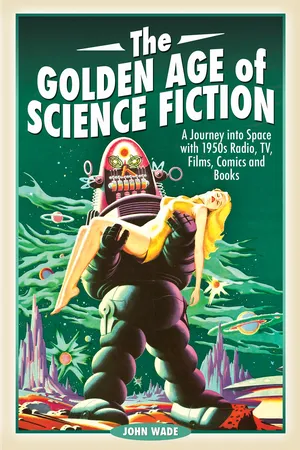
eBook - ePub
The Golden Age of Science Fiction
A Journey into Space with 1950s Radio, TV, Films, Comics and Books
- 240 pages
- English
- ePUB (mobile friendly)
- Available on iOS & Android
eBook - ePub
The Golden Age of Science Fiction
A Journey into Space with 1950s Radio, TV, Films, Comics and Books
About this book
A detailed look at the British world of science fiction in the 1950s.
John Wade grew up in the 1950s, a decade that has since been dubbed the "golden age of science fiction." It was a wonderful decade for the genre, but not so great for young fans. With early television broadcasts being advertised for the first time as "unsuitable for children" and the inescapable barrier of the "X" certificate in the cinema barring anyone under the age of sixteen, the author had only the radio to fall back on—and that turned out to be more fertile for the budding SF fan than might otherwise have been thought. Which is probably why, as he grew older, rediscovering those old TV broadcasts and films that had been out of bounds when he was a kid took on a lure that soon became an obsession.
For him, the super-accuracy and amazing technical quality of today's science fiction films pale into insignificance beside the radio, early TV and B-picture films about people who built rockets in their back gardens and flew them to lost planets, or tales of aliens who wanted to take over, if not our entire world, then at least our bodies. This book is a personal account of John Wade's fascination with the genre across all the entertainment media in which it appeared—the sort of stuff he reveled in as a young boy—and still enjoys today.
"Not only a well–researched book grounded in hundreds of sources, but also an unmistakable labor of love." —New York Journal of Books
John Wade grew up in the 1950s, a decade that has since been dubbed the "golden age of science fiction." It was a wonderful decade for the genre, but not so great for young fans. With early television broadcasts being advertised for the first time as "unsuitable for children" and the inescapable barrier of the "X" certificate in the cinema barring anyone under the age of sixteen, the author had only the radio to fall back on—and that turned out to be more fertile for the budding SF fan than might otherwise have been thought. Which is probably why, as he grew older, rediscovering those old TV broadcasts and films that had been out of bounds when he was a kid took on a lure that soon became an obsession.
For him, the super-accuracy and amazing technical quality of today's science fiction films pale into insignificance beside the radio, early TV and B-picture films about people who built rockets in their back gardens and flew them to lost planets, or tales of aliens who wanted to take over, if not our entire world, then at least our bodies. This book is a personal account of John Wade's fascination with the genre across all the entertainment media in which it appeared—the sort of stuff he reveled in as a young boy—and still enjoys today.
"Not only a well–researched book grounded in hundreds of sources, but also an unmistakable labor of love." —New York Journal of Books
Frequently asked questions
Yes, you can cancel anytime from the Subscription tab in your account settings on the Perlego website. Your subscription will stay active until the end of your current billing period. Learn how to cancel your subscription.
No, books cannot be downloaded as external files, such as PDFs, for use outside of Perlego. However, you can download books within the Perlego app for offline reading on mobile or tablet. Learn more here.
Perlego offers two plans: Essential and Complete
- Essential is ideal for learners and professionals who enjoy exploring a wide range of subjects. Access the Essential Library with 800,000+ trusted titles and best-sellers across business, personal growth, and the humanities. Includes unlimited reading time and Standard Read Aloud voice.
- Complete: Perfect for advanced learners and researchers needing full, unrestricted access. Unlock 1.4M+ books across hundreds of subjects, including academic and specialized titles. The Complete Plan also includes advanced features like Premium Read Aloud and Research Assistant.
We are an online textbook subscription service, where you can get access to an entire online library for less than the price of a single book per month. With over 1 million books across 1000+ topics, we’ve got you covered! Learn more here.
Look out for the read-aloud symbol on your next book to see if you can listen to it. The read-aloud tool reads text aloud for you, highlighting the text as it is being read. You can pause it, speed it up and slow it down. Learn more here.
Yes! You can use the Perlego app on both iOS or Android devices to read anytime, anywhere — even offline. Perfect for commutes or when you’re on the go.
Please note we cannot support devices running on iOS 13 and Android 7 or earlier. Learn more about using the app.
Please note we cannot support devices running on iOS 13 and Android 7 or earlier. Learn more about using the app.
Yes, you can access The Golden Age of Science Fiction by John Wade in PDF and/or ePUB format, as well as other popular books in Social Sciences & Modern British History. We have over one million books available in our catalogue for you to explore.
Information
Chapter One
Science Fiction on Radio
Someone once said, ‘Radio is like television, only the pictures are better.’ I first heard the quote from renowned radio producer and writer Charles Chilton, who was prolific within BBC Radio during the 1950s. I met and interviewed him in the early 1980s, and the quotes from him that follow later come from that interview.
Whoever it was that first came up with that quote hit upon one essential aspect of radio drama: the pictures generated in your head when you listen to a radio broadcast are so much more vivid than what is feasible to show on a television screen.
Another radio producer whom I met when I was trying – unsuccessfully as it turned out – to break into writing radio drama, put it this way. ‘Let us imagine,’ he said, ‘that we are adapting the film Zulu for radio or television. In the radio version, one of the cast says, “My God, there are thousands of Zulus pouring over that hill, and they’re coming straight for us!”Then a suitable sound effect kicks in and the listener sees the scene come horrifyingly to life in his or her head. On television, we would need a cast of thousands to make that same scene work, and the budget isn’t going to stand for it. So, instead, we have to make do with seeing a character pointing his head out of a tent and saying to someone inside, “My God, there are thousands of Zulus pouring over that hill, and they’re coming straight for us!” What we don’t see are the Zulus. That’s why “pictures” on the radio are so much better than on television.’
This of course was before the days of computer-generated imagery (CGI), whose advent in the 1970s made the impossible a lot more possible than before. It was certainly true of the 1950s, when science fiction on radio took the listener to the Moon and Mars and many more places beyond. Black and white television dramas of the day with wobbly cardboard scenery could never hope to make those same journeys and destinations seem nearly so realistic.
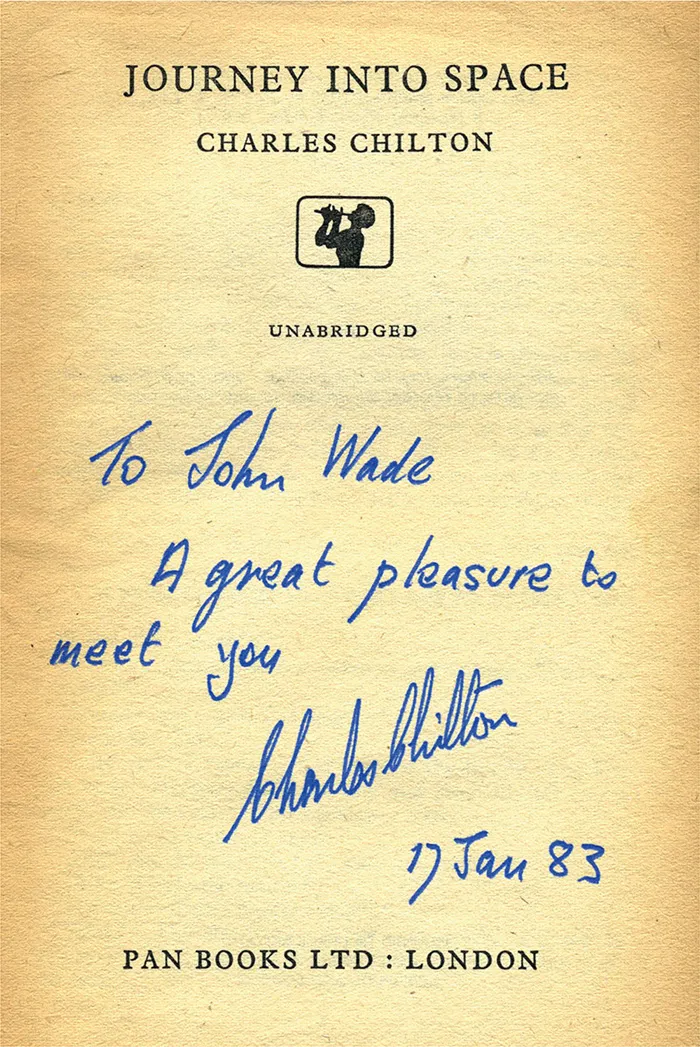
The title page of Journey Into Space, autographed many years ago by Charles Chilton for the author of the book you are now reading.

For many 1950s science fiction fans, radio of the time was where the obsession began.
British radio in the 1950s of course meant, first and foremost, the BBC. Although it was possible to pick up scratchy, fading broadcasts from overseas stations, the mainstay of British radio was the BBC’s Light Programme, Home Service and Third Programme. In 1967, Radio 1 was launched to combat the pirate radio stations that had been relaying pop music from ships outside the legal 3-mile broadcasting limit. At the same time, the Light Programme became Radio 2, the Home Service became Radio 4 and the Third Programme became Radio 3. So if radio science fiction was what you craved during that golden age, it was mostly, though not exclusively, to the Light Programme or the Home Service that listeners inevitably turned.
Here are some of the amazing flights of fancy that radio took us on in the 1950s, starting with one of the true greats …
JOURNEY INTO SPACE
On Monday, 21 September 1953, at seven-thirty in the evening, the first episode of a new radio serial was broadcast on the BBC Light Programme. It was like nothing that had been heard on radio before, and its like will probably never be heard again. It was called Journey Into Space, with the subtitles Journey to the Moon or Operation Luna. The Radio Times, adding its own subtitle A Tale of the Future, had this to say about episode one:
The year is 1965 and at a proving ground in New Mexico Sir William Morgan, a leading research scientist, is about to launch an experimental space rocket. Meanwhile his son Jet, piloting a super stratoship sixty miles above the Atlantic on its first passenger trip from London to New York, is racing the clock in order to be at his father’s side. But at New Mexico there is a hitch which dramatically affects the whole situation …
That brief summation didn’t say much about the story that was about to unfold, dealing as it would with a flight to the Moon, encounters with aliens and even a brush with time travel. The difference between the way the series started and the way it developed could well have been down to the rather haphazard way in which it was written.
Don’t get the idea from this, however, that the writer was unfit for the job. On the contrary, he was a tremendously successful radio producer whose writing talents kept his listeners on the edges of their seats for weeks, during three series and fifty-eight episodes of Journey Into Space. His name was Charles Chilton.
The man behind the series
Charles Chilton was born in North London in 1917. He joined the BBC as a messenger boy at the age of fifteen, later moving up to work in the Corporation’s gramophone library. It was here that he discovered a love of jazz and was responsible for the BBC’s first jazz programme, Kings of Jazz, which he introduced, making him possibly the BBC’s first disc jockey. The programme only went ahead, he later explained, when he was able to convince his bosses that jazz music wouldn’t contaminate the airwaves.
He was also one of the producers of The Goon Show and the Billy Cotton Band Show, in which he even managed to introduce a little science fiction to the Sunday lunchtime entertainment with a character in a flying saucer, who was heard to look down on the bandleader from above calling out: ‘Hey, you down there with the glasses.’ Chilton’s versatility led him to producing shows that ranged from comedy classics like Take It From Here to documentaries on subjects as diverse as Victorian Britain and the American Civil War.
In the 1960s, Chilton enjoyed tremendous theatrical and film success when his radio programme The Long, Long Trail was adapted to become Oh! What a Lovely War, which juxtaposed the horrors of the First World War with music hall songs of the day.
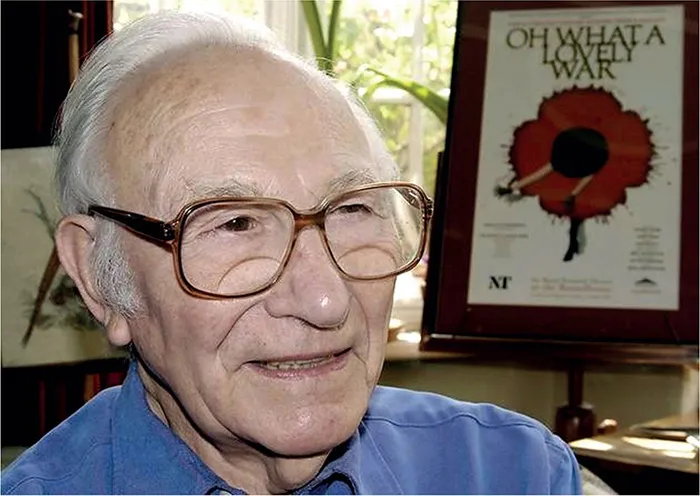
Charles Chilton, the radio producer and writer behind Journey Into Space.
But back in the 1950s, the BBC, with one eye on popular cinema of the day, where films like Destination Moon (1950) and The Day the Earth Stood Still (1951) were proving popular, identified a need for science fiction on the radio. The problem was they couldn’t find anyone to write it. Although essentially a producer, Chilton had already had success in writing fiction for radio in 1949 with Riders of the Range, a western series, which also became a comic strip in the Eagle. So he stepped forward and offered to try his hand at radio science fiction.
Along with his interest in the American West, Chilton had always loved science fiction, reading magazines like Amazing Stories when he was young and devouring the books of H.G. Wells. The influences were later to be seen in his own writing. When, in the first series of Journey Into Space, the ship is stuck on the moon, the captain reads to the crew from Wells’s The First Men in the Moon, and when a strange knocking noise is heard from the outside, one of the characters comments: ‘It’s one of H.G. Wells’s lot.’
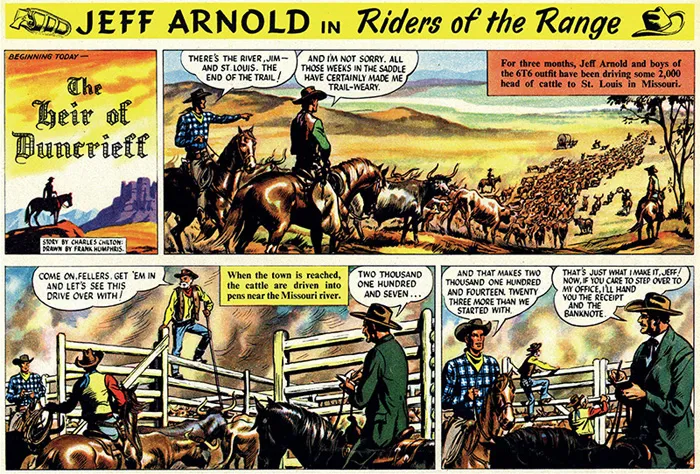
Charles Chilton’s comic strip Riders of the Range, which was published in the boys’ comic Eagle.
Although Chilton had no scientific qualifications of his own, he was a keen amateur astronomer and was determined that the science in Journey Into Space would be as accurate as possible. So he enlisted Farnborough rocket designer Kenneth Gatland as technical adviser. Under contract as a producer, Chilton didn’t get paid for his writing talents. ‘In those days the BBC thought that if you were so filled with the urge to write, then they wouldn’t stop you,’ he commented some years later. ‘I think that attitude stopped shortly after the success of Journey Into Space.’
Not that the programme was a guaranteed success from the start. After three weeks, the BBC wanted to take it off the air and Chilton was called in by the Head of the Light Programme, who told him he knew it was no good because his grandchildren didn’t like it. Chilton persuaded him to let it run for eight weeks, by which time it was so popular that they asked him to keep going. In the end, that first series ran for eighteen episodes.
Chilton wrote the scripts from week to week, not really knowing where it was going next, usually starting the writing on a Friday night, ready for Monday’s broadcast. Once, he wrote an episode a week in advance, but when it got to Thursday, he tore it up and started again. He later said that if he had known people were taking it so seriously, he would have been terrified.
Charles Chilton died in 2013, age 95.
Cast and characters
The four main characters of the series were Captain Jet Morgan and his crew of three: Stephen Mitchell, known as Mitch; Doc Matthews; and Lemmy Barnet. During the course of three series there were a few changes of actors.
In series one, Jet Morgan was played by Andrew Faulds and Doc Matthews by Guy Kingsly Poynter. Mitch was played by Bruce Beeby for the first six episodes, and by Don Sharp for the remaining twelve. Lemmy was played by David Kossoff. In series two, Andrew Faulds and Guy Kingsley Poynter played the same characters again, but Mitch was played by Bruce Beeby throughout, and Alfie Bass took over from David Kossoff to play Lemmy halfway through. In series three, Andrew Faulds and Guy Kingsley Poynter retained their roles, Alfie Bass played Lemmy and Don Sharp played Mitch throughout.
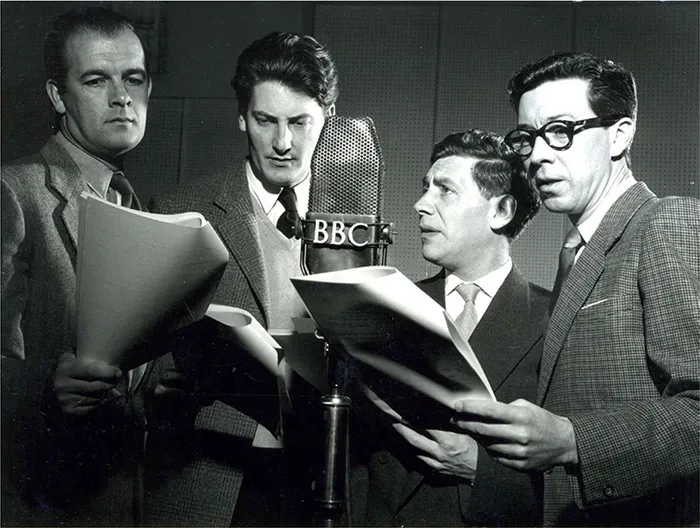
The cast of Journey Into Space stand by for take-off around the microphone. Left to right, they are Don Sharp as Stephen Mitchell or Mitch, Andrew Faulds as Jet Morgan, Alfie Bass as Lemmy Barnet and Guy Kingsley Poynter as Doc Matthews.
Andrew Faulds was born in Tanganyika in 1923, the son of missionary parents, and in the years that followed the success of Journey Into Space, he had roles in more than twenty-five films, which included The Trollenberg Terror (1958), Blood of the Vampire (1958), The Flesh and the Fiends (1960), Jason and the Argonauts (1963) and Cleopatra (1963). He subsequently went into politics and became a member of parliament for Smethwick in 1966. He was known for his loud and often controversial opinions and statements in the House. He died in 2000.
Bruce Beeby was an Australian actor, born in 1921, who worked mostly in British films and TV. Among the films he made between 1945 and 1964, he shared credits with Andrew Faulds in A Matter of WHO, about the search for a deadly virus. He died in 2013.
Don Sharp was born in Tasmania in 1921. His most famous roles were in horror films for the Hammer Studios, including The Kiss of the Vampire (1962) and Rasputin, the Mad Monk (1965). In 1965 and 1966, he also directed The Face of Fu Manchu and The Brides of Fu Manchu. He died in 2011.
Guy Kingsley Poynter was an American actor, born in 1915. His film credits included Floods of Fear (1958) and The Girl...
Table of contents
- Cover
- Dedication
- Title
- Copyright
- Contents
- Introduction
- Chapter 1 Science Fiction on Radio
- Chapter 2 Science Fiction on Television
- Chapter 3 Science Fiction on Film
- Chapter 4 Science Fiction in Books
- Chapter 5 Science Fiction Comics and Magazines
- Picture Credits